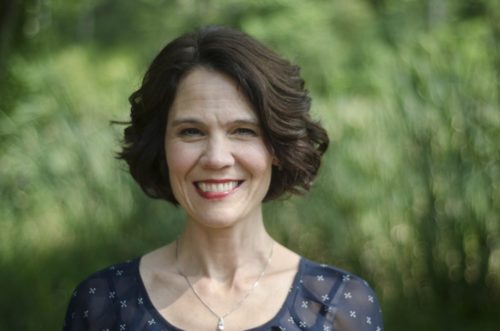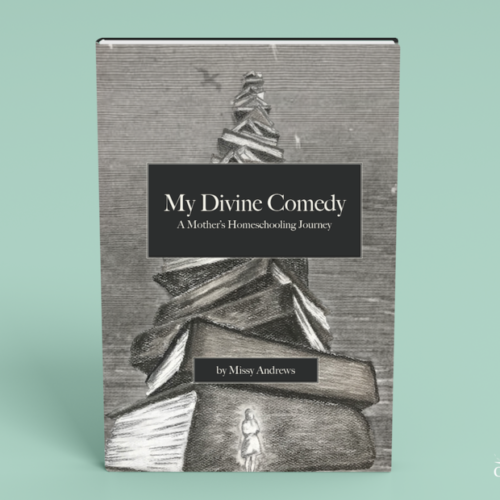
When I first came across Missy Andrews’ recently published memoir My Divine Comedy: A Mother’s Homeschooling Journey, I was a bit skeptical. I was intrigued by what I presumed to be her titular pun on Dante’s Divine Comedy. But what do I have in common with a mother on a homeschooling journey? I’m not a mother; I’m a recent college graduate far off from marriage and children. I was not a homeschooler, and neither do I plan to homeschool. My current “journey” is how to do life now that the school part is over (at least for now). As it turns out, however, I have a lot in common with Andrews, and a lot to learn from her memoir. We all do.

Andrews’ memoir is a reflection on her 25 years of homeschooling her six children and all the mistakes made and humility garnered through that exhausting and rewarding experience. But it is more than that. Andrews deftly weaves snippets of Austen, Shakespeare, O’Connor, Milton, and of course, Dante, throughout her story. (I immediately felt a kinship with Andrews when she opened her first chapter with two epigraphs from Dostoevsky’s Brothers Karamazov, which, thanks to Andrews, I have now managed to mention in my third post in a row.)
Her memoir is both a personal and a universal confession, a thoughtful treasury of divine revelations, and a reminder that the worldly, often self-imposed “little-l laws” and the Law of God alike tempt us into 1) toxic performativity or 2) reckless rebellion, both of which ultimately leave us unsatisfied. It is a story of equating doing with being, performance with identity, and the disappointment that awaits such a mix-up. More than a homeschooling journey, Andrews’ journey is one all Christians share: a journey to the foot of the cross—to Christ crucified and boundless grace. Isn’t that where we’re all trying to go?
Her memoir, like all good literature, is both particular and universal. As Andrews herself puts it: “a particular artistic piece, without losing its individuality, bears witness to a corporate or universal experience.” The most universal and human experience of all is realizing and reckoning with our brokenness and it is to this experience Andrews’ memoir bears witness. Throughout the challenging years of homeschooling her children, her eyes are opened to her utter inability to win at homeschooling, mothering, or human-ing. She calls hers “the story of a divine mercy killing,” and by that she means that the Lord “allowed the consequences of my sin to kill me,” so that he could deliver her from the “economy of death” into another economy: “the economy of grace.” Throughout her book, Andrews posits our default (and deathly) “performance economy” against the divine “economy of grace” and shows just how unworldly—and how infinitely better—the latter is.

One of my favorite of her personal stories of a “divine mercy killing” comes in the chapter “Better Conduct: The Performer,” when Andrews recalls “a friend who is what we Christians might call a ten-talent woman. She is articulate, beautiful, smart, and funny.” She is fashionable, successful, energetic, and interesting. In other words, she has it all. Don’t we all know someone like that? Next to her, Andrews felt like “an uninteresting drudge of a washerwoman—just a stay-at-home mom,” and for that she resented her. One day the “lid flew off” and she unleashed a violent outburst against her friend, essentially telling her she never wanted to see her again. Soon after, Andrews attended a women’s retreat about self-awareness and transparency and left feeling like she had been “public[ly] unclothed. All the time I had spent with these women thinking I was acceptable, I had really been walking around naked. They saw me more clearly than I saw myself.” She continues:
I was devastated, sure that I was no longer acceptable to anyone. In my distress, I had the audacity to call my friend. Whatever possessed me to pick up that phone, I will never know. Of all the people in my life, she had the most cause to hammer the nails into my coffin at that moment, but she did not. Instead, she listened. She cried with me. She told me that she would love me—that she had my back. Then, she hopped in her car and drove seven hours to arrive on my doorstep with a bottle of wine and a bag of chocolates just to make sure I had heard her. That undeserved love, that act of grace, might have been the first I was ever vulnerable enough to perceive …
This relationship with my friend was the first time in which there was no way to narrate the story that would allow me to perceive myself as good. I was not a good friend to her. I was hateful, and she had returned my hatred with love. The discontinuity of the exchange rose above the din of my fearful heart, and I heard her. Grace alone penetrated the tough shell of my performance economy.
When our performance becomes our identity, we can sometimes convince ourselves that we have earned the love we receive from others. As a result, we dismiss it … In the score-keeping game of performance, there are only losers; no one really wins. That is the severe mercy of Got at work for us. If we could achieve identity and righteousness without God, we would all do it, but He loves us too much to allow us to miss our created purpose in this world: to know Him and His great love for us and to enjoy Him forever.
It really is that simple: grace alone. We cannot ever perform our way into righteousness. And though we killed the only one who could, He offered us mercy instead. A story of divine mercy killing, indeed.

COMMENTS
Leave a Reply












